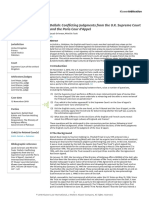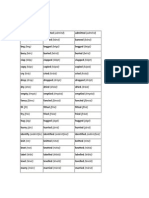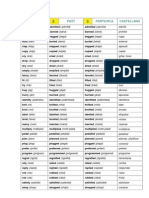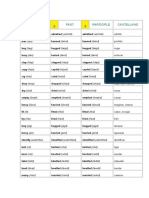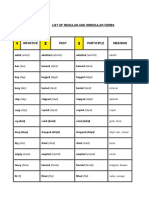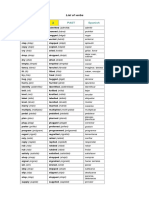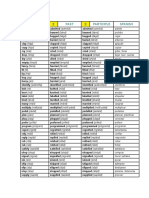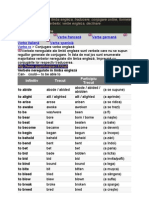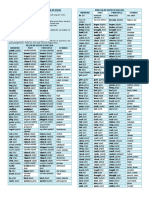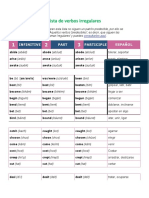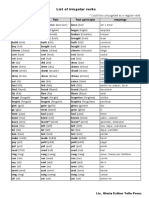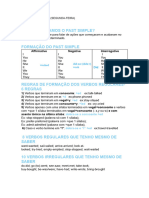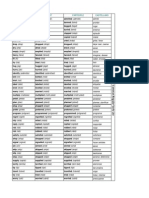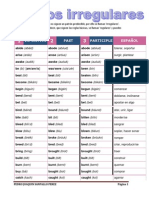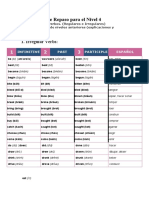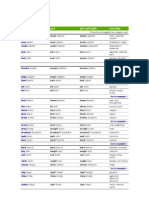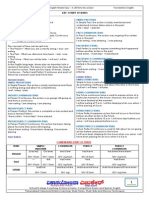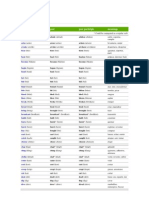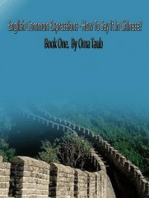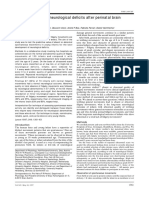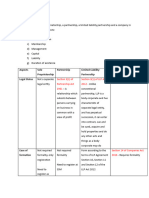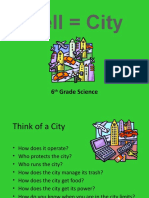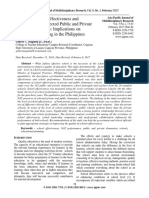Past Progressive Tense: Simple Past (Past Simple)
Past Progressive Tense: Simple Past (Past Simple)
Uploaded by
Christopher MeadowsOriginal Description:
Original Title
Copyright
Available Formats
Share this document
Did you find this document useful?
Is this content inappropriate?
Report this DocumentCopyright:
Available Formats
Past Progressive Tense: Simple Past (Past Simple)
Past Progressive Tense: Simple Past (Past Simple)
Uploaded by
Christopher MeadowsCopyright:
Available Formats
The PAST PROGRESSIVE TENSE indicates continuing action,
something that was happening, going on, at some point in the past. This
tense is formed with the helping "to be" verb, in the past tense, plus the
present participle of the verb (with an -ing ending):
I was riding my bike all day yesterday.
Joel was being a terrible role model for his younger brother.
The past progressive indicates a limited duration of time and is thus a
convenient way to indicate that something took place (in the simple past)
while something else was happening:
Carlos lost his watch while he was running.
The past progressive can express incomplete action.
I was sleeping on the couch when Bertie smashed through the door.
(as opposed to the simple past, which suggests a completed action:
I slept on the couch last night.
The past progressive is also used to poke fun at or criticize an action that
is sporadic but habitual in nature:
Tashonda was always handing in late papers.
My father was always lecturing my brother.
Simple Past (Past Simple)
The simple past expresses an action in the past taking place once, never, several times. It can
also be used for actions taking place one after another or in the middle of another action.
Form of Simple Past
Positive Negative Question
no differences I spoke. I did not speak. Did I speak?
Exceptions in Spelling when Adding ed
Exceptions in spelling when adding ed Example
after a final e only add d love loved
final consonant after a short, stressed vowel
or l as final consonant after a vowel is doubled
admit admitted
travel travelled
final y after a consonant becomes i hurry hurried
Lista de Verbos Regulares
1
INFINITIVE
2
PAST
3
PARTICIPLE CASTELLANO
admit (admt) admitted (admtid) admitted (admtid) admitir
ban (ban) banned (bnd) banned (bnd) prohibir
beg (beg) begged (bgd) begged (bgd) rogar
bury (bri) buried (brid) buried (brid) enterrar
clap (klp) clapped (klpt) clapped (klpt) aplaudir
copy (kpi) copied (kpid) copied (kpid) copiar
cry (kri) cried (krid) cried (krid) gritar, llorar
drop (drop) dropped (drpt) dropped (drpt) dejar caer, caerse
dry (dri) dried (drid) dried (drid) secar
empty (mpti) emptied (mptid) emptied (mptid) vaciar
fancy (fnsi) fancied (fnsid) fancied (fnsid) imaginar, desear
fit (fit) fitted (ftid) fitted (ftid) caber, encajar
fry (fri) fried (frid) fried (frid) frer
hug (jg) hugged (jgd) hugged (jgd) abrazar
hurry (jri) hurried (jrid) hurried (jrid) apurarse
identify (aidntifai) identified (aidntifaid) identified (aidntifaid) identificar
knit (nit) knitted (ntid) knitted (ntid) tejer
knot (not) knotted (ntid) knotted (ntid) anudar
label (libl) labelled (libld) labelled (libld) etiquetar
level (lvel) levelled (lveld) levelled (lveld) nivelar
marry (mri) married (mrid) married (mrid) casarse
multiply (mltplai) multiplied (mlt-plid) multiplied (mlt-plid) multiplicar
pedal (pdal) pedalled (pdald) pedalled (pdald) pedalear
plan (plan) planned (pland) planned (pland) planear, planificar
plug (plag) plugged (plagd) plugged (plagd) conectar
prefer (prfr) preferred (prifert) preferred (prifert) preferir
program (prgram) programmed (prgramd) programmed (prgramd) programar
regret (rigrt) regretted (rigrtid) regretted (rigrtid) lamentarse
rely (reli) relied (relid) relied (relid) confiar
reply (repli) replied (repldt) replied (replid) responder
rob (rb) robbed (rbd) robbed (rbd) robar
rub (rab) rubbed (rbd) rubbed (rbd) frotar
satisfy (satisfi) satisfied (satisfid) satisfied (satisfid) satisfacer
shop (shop) shopped (shpt) shopped (shpt) comprar
signal (sgnal) signalled (sgnald) signalled (sgnald) hacer seales
sin (sn) sinned (snd) sinned (snd) pecar
skip (skp) skipped (skpt) skipped (skpt) saltearse
slip (slp) slipped (slpt) slipped (slpt) deslizarse
stop (stop) stopped (stpt) stopped (stpt) pararse, detenerse
supply (sapli) supplied (saplid) supplied (saplid) proveer
terrify (trrifai) terrified (trri-fid) terrified (trri-fid) aterrorizar
tip (tp) tipped (tpt) tipped (tpt) dar propina
travel (trvel) travelled (trveld) travelled (trveld) viajar
try (tri) tried (trid) tried (trid) tratar, intentar
worry (uri) worried (urid) worried (urid) preocuparse
Lista de Verbos Irregulares:
1
INFINITIVE
2
PAST
3
PARTICIPLE CASTELLANO
be (bi) was/were (us/ur) been (bin) ser, estar
become (bikm) became (bikim) become (bikm) llegar a ser
begin (bigun) began (bign) begun (bign) comenzar
break (brik) broke (bruk) broken (brukn) romper
bring (bring) brought (brot) brought (brot) traer
build (bilt) built (bilt) built (bilt) construir
buy (bi) bought (bot) bought (bot) comprar
catch (kach) caught (kot) caught (kot) agarrar
choose (chus) chose (chos) chosen (chsn) elegir
come (km) came (kem) come (km) venir
cut (kat) cut (kat) cut (kat) cortar
do (d) did (dd) done (dn) hacer
draw (dr) drew (dr) drawn (drn) dibujar
drink (drink) drank (drnk) drunk (drank) beber
drive (driv) drove (druv) driven (drvn) conducir
eat (:t) ate (et) eaten (tn) comer
fall (fol) fell (fel) fallen (flen) caer
feel (f:l) felt (felt) felt (felt) sentir
find (find) found (fand) found (fund) encontrar
fly (fli) flew (flu) flown (fln) volar
forget (forgut) forgot (forgt) forgotten (forgtn) olvidar
get (gut) got (got) got/gotten (got/gotn) obtener, conseguir
give (guv) gave (guiv) given (gvn) dar
go (gu) went (unt) gone (gun) ir
grow (gru) grew (gr) grown (grn) cultivar, crecer
hang (jng) hung (jng) hung (jng) colgar
have (jev) had (jad) had (jad) tener, haber
hear (jar) heard (jerd) heard (jerd) oir
keep (k:p) kept (kept) kept (kept) guardar
know (nu) knew (ni) known (nun) saber, conocer
learn (lrn) learnt (lernt) learnt (lernt) aprender
lose (l:s) lost (lost) lost (lost) perder
make (mik) made (mid) made (mid) hacer, fabricar
meet (m:t) met (met) met (met) encontrarse con
pay (pi) paid (ped) paid (ped) pagar
put (put) put (put) put (put) poner
read (rid) read (red) read (red) leer
ride (rid) rode (rud) ridden (rdn) cabalgar
ring (ring) rang (reng) rung (rang) sonar
run (ran) ran (ren) run (ran) correr
say (si) said (sed) said (sed) decir
see (s:) saw (su) seen (sin) ver
sell (sel) sold (sold) sold (sold) vender
send (send) sent (sent) sent (sent) enviar
show (shu) showed (shut) shown (shun) mostrar
shut (shat) shut (shat) shut (shat) cerrar
sing (sing) sang (seng) sung (sang) cantar
sleep (slp) slept (slpt) slept (slpt) dormir
smell (smel) smelt (smelt) smelt (smelt) oler
speak (spik) spoke (spuk) spoken (spukn) hablar
spend (spend) spent (spent) spent (spent) gastar, pasar
stand (stand) stood (st:d) stood (st:d) pararse
steal (stl) stole (stul) stolen (stln) robar
swim (sum) swam (sum) swum (sum) nadar
take (tik) took (tul) taken (tikn) tomar, llevar
teach (tch) taught (tot) taught (tot) ensear
tell (tel) told (told) told (told) decir, contar
think (zink) thought (zot) thought (zot) pensar, creer
wake (uik) woke (uuk) waken (uikn) despertarse
wear (uar) wore (ur) worn (urn) usar (ropa)
win (un) won (un) won (un) ganar
write (rit) wrote (rut) written (rtn) escribir
Used To
FORM
[used to + VERB]
Example:
I used to go to the beach every day.
It is better not to use "used to" in questions or negative forms; however, this is
sometimes done in informal spoken English. It is better to ask questions and
create negative sentences using Simple Past.
USE 1 Habit in the Past
"Used to" expresses the idea that something was an old habit that stopped in
the past. It indicates that something was often repeated in the past, but it is not
usually done now.
Examples:
Jerry used to study English.
Sam and Mary used to go to Mexico in the summer.
I used to start work at 9 o'clock.
Christine used to eat meat, but now she is a vegetarian.
USE 2 Past Facts and Generalizations
"Used to" can also be used to talk about past facts or generalizations which are
no longer true.
Examples:
I used to live in Paris.
Sarah used to be fat, but now she is thin.
George used to be the best student in class, but now Lena is the best.
Oranges used to cost very little in Florida, but now they are quite expensive.
"Used to" vs. Simple Past
Both Simple Past and "Used to" can be used to describe past habits, past facts
and past generalizations; however, "used to" is preferred when emphasizing
these forms of past repetition in positive sentences. On the other hand, when
asking questions or making negative sentences, Simple Past is preferred.
Examples:
You used to play the piano.
Did you play the piano when you were young?
You did not play the piano when you were young.
going to-future
Use
1) planned actions in the future
We are going to sing at the party.
2) You are certain that sth. is going to happen in the future.
Look at that car! It is going to crash into the yellow one.
Signal words
no unambiguous ones
Form
to be (am, are, is) + going to + infinitive
Examples
Affirmative sentences:
I am going to play handball.
I'm going to play handball.
You are going to play handball.
You're going to play handball.
Negative sentences:
I am not going to play handball.
I'm not going to play handball.
You are not going to play handball.
You're not going to play handball.
You aren't going to play handball.
Questions:
Am I going to play handball? Are you going to play handball?
Will
"Will" is used with promises or voluntary actions that take place in the future.
"Will" can also be used to make predictions about the future. For more
information on using "will" and associated exercises, visit the Simple
Future section of our Verb Tense Tutorial.
Examples:
I promise that I will write you every single day. PROMISE
I will make dinner tonight. VOLUNTARY ACTION
He thinks it will rain tomorrow. PREDICTION
More Examples of "Will"
Modal Use Positive Forms Negative Forms You
can
also
use:
will
FUTURE
ACTION,
PREDICTION
The marketing director will be
replaced by someone from the
New York office.
Fred will be there by 8:00.
The marketing director
will not be replaced
after all.
Fred will not be
there. He has a
previous obligation.
shall
will
VOLUNTEERING,
PROMISING
I will take care of everything for
you.
I will make the travel
arrangements. There's no
need to worry.
I will never forget you.
I will never give up
the fight for freedom.
shall
Auxiliary Verbs "Can/Could" and
"May/Might/Must"
Can
Used to express ability (to be able to do something):
I can make jewelry.
He cant speak French.
Can you open this jar?
Used to ask for permission:
Can I use your bathroom?
Can I leave now?
Can I raise the volume?
Used to make requests or suggestions:
Can I have more napkins?
Can I have the bill?
You can take this spot if you like.
You can do whatever you want.
Could (past form of can)
Describes an ability that someone had in the past:
I could swim when I was young.
You could see the boat sinking.
They could tell he was nervous.
Often used in auxiliary functions to express permission politely:
Could I take this jacket with me?
You could borrow my umbrella.
Could you please let me pass you?
Could I get you more water?
Used to express possibility:
All of them could ride in the van.
You could always stay at our house.
Could it be true?
This plan could really work out.
May
Used to ask for formal permission:
May I come in?
May I say something now?
May I ask one question?
Used to suggest something that is possible:
She may agree with this plan.
They may not be happy about what happened.
It may shower tonight.
Might (past form of may)
Used to suggest a smaller possibility than may does (actually, might is more
common than may in American English):
He might have finished it.
I might go see a doctor.
I might not come this time.
It might be right.
You might have lost it.
The store might have been closed today.
Must
Used to express something formally required or necessary:
I must complete the project by this week.
The government must provide health care for everybody.
Everyone must save the natural resources of the earth.
The building must have a fire alarm.
You must answer my question right now.
Used to show that something is very likely:
He must be a genius.
You must be joking!
There must be an accident.
She must be very tired.
You might also like
- Mid Year Reflections Workbook PrintableDocument7 pagesMid Year Reflections Workbook PrintableroslinmaiaNo ratings yet
- Verb List MatiasDocument4 pagesVerb List MatiasSol PeiranoNo ratings yet
- Passive VoiceDocument20 pagesPassive Voicesvitla0192% (13)
- XMP1 System Description R5.5 PDFDocument374 pagesXMP1 System Description R5.5 PDFIan CutinNo ratings yet
- Dallah - Conflicting Judgments From The UK Supreme Court and The Paris Cour D'appelDocument16 pagesDallah - Conflicting Judgments From The UK Supreme Court and The Paris Cour D'appelDevon ButeNo ratings yet
- Elements of A Poetry: Analyzing A Two-Stanza PoemDocument23 pagesElements of A Poetry: Analyzing A Two-Stanza Poemglazegamolo100% (2)
- English Verb List: Teacher: Fabián A. Barraza Rocha Modules: English I and IIIDocument5 pagesEnglish Verb List: Teacher: Fabián A. Barraza Rocha Modules: English I and IIIKyle KirbyNo ratings yet
- List of Regular VerbsDocument6 pagesList of Regular VerbsNec'ArcD'MahouNo ratings yet
- Infinitive Past Participle CastellanoDocument4 pagesInfinitive Past Participle CastellanotelechubiesNo ratings yet
- List of Regular VerbsDocument6 pagesList of Regular VerbsbeanexNo ratings yet
- Infinitive Past Participle Español: Regular VerbsDocument4 pagesInfinitive Past Participle Español: Regular VerbsKarla Rojas ArellanoNo ratings yet
- List of Regular and Irregular VerbsDocument8 pagesList of Regular and Irregular VerbsSofia Campos GajardoNo ratings yet
- List of Regular and Irregular VerbsDocument4 pagesList of Regular and Irregular VerbsPablo Hidalgo DelgadoNo ratings yet
- Infinitive Past Participle Español: Verbos IrregularesDocument10 pagesInfinitive Past Participle Español: Verbos IrregularesXochitl ZavalaNo ratings yet
- Infinitive Past Participle CastellanoDocument3 pagesInfinitive Past Participle CastellanoAlejandro GomezNo ratings yet
- List of Verbs - Present and Past FormDocument6 pagesList of Verbs - Present and Past FormRosalba BryanNo ratings yet
- Irregular - Regular VerbsDocument4 pagesIrregular - Regular Verbskaren rivasNo ratings yet
- Regular Verb ListDocument3 pagesRegular Verb Listelizabeth AraujoNo ratings yet
- Verbos Ingles para DuviDocument6 pagesVerbos Ingles para DuviillaNo ratings yet
- Infinitive Past Participle Castellano: Irregular Verbs ListDocument4 pagesInfinitive Past Participle Castellano: Irregular Verbs ListtedarpeNo ratings yet
- Irregular VBDocument10 pagesIrregular VBElena PopaNo ratings yet
- Verb ListDocument4 pagesVerb ListIrlanda Ceballos FuentealbaNo ratings yet
- A Verb List Lista de Verbos RegularesDocument17 pagesA Verb List Lista de Verbos RegularesGaby CastroNo ratings yet
- Verbs ListDocument2 pagesVerbs ListJosue UribeNo ratings yet
- Verbos IrregularesDocument7 pagesVerbos IrregularesOscar Masiel MasNo ratings yet
- List VerbDocument4 pagesList VerbPABLOCAESARNo ratings yet
- Irregular Verbs List BULL MODULES UNILLANOS by Melba MorenoDocument4 pagesIrregular Verbs List BULL MODULES UNILLANOS by Melba MorenoKEVIN SANTIAGO MORENO LESMESNo ratings yet
- Verbos IrregularesDocument5 pagesVerbos IrregularesErick SerranoNo ratings yet
- Test VerbsDocument30 pagesTest VerbsKarina Bajaña MendozaNo ratings yet
- Present Past P. Participle Traducción: Abide Arise Awake Bear Beat Become Begin Bend Bet BidDocument17 pagesPresent Past P. Participle Traducción: Abide Arise Awake Bear Beat Become Begin Bend Bet BidBerk CornieNo ratings yet
- Lista de Verbos Irregulares: Infinitive Past Participle EspañolDocument6 pagesLista de Verbos Irregulares: Infinitive Past Participle Españolatomo1985No ratings yet
- THEME 10 - List of Irregular VerbsDocument2 pagesTHEME 10 - List of Irregular VerbsSheila Lizeth Huaraca AcuñaNo ratings yet
- Lista Mezclada de VerbosDocument3 pagesLista Mezclada de VerbosSantiagoNo ratings yet
- Verbos en Ingles: Infinitivo Pasado EspañolDocument4 pagesVerbos en Ingles: Infinitivo Pasado EspañolLiceth VillegasNo ratings yet
- Cuadro Verbal en InglesDocument5 pagesCuadro Verbal en InglesMiltonAdolfoNo ratings yet
- Resumos TESTE INGLÊSDocument4 pagesResumos TESTE INGLÊSMariana castroNo ratings yet
- Verbos Regulares e IrregularesDocument4 pagesVerbos Regulares e IrregularesJaime Ernesto ChitacapaNo ratings yet
- Regular and Irregular Verb ListDocument3 pagesRegular and Irregular Verb ListMichael J. FerranNo ratings yet
- Verbos Irregulares InglesDocument5 pagesVerbos Irregulares InglesDiego PuertoNo ratings yet
- Infinitive Simple Past Past Participle Meaning: (Aprícieit)Document13 pagesInfinitive Simple Past Past Participle Meaning: (Aprícieit)jaluzivonNo ratings yet
- Infinitivo Pasado Participio ESPAÑOL (Col.3) : Ed Ed Ed EdDocument4 pagesInfinitivo Pasado Participio ESPAÑOL (Col.3) : Ed Ed Ed EdDB IsNo ratings yet
- Verbos IrregularesDocument5 pagesVerbos IrregularesLocoNo ratings yet
- Infinitive Past Participle EspañolDocument5 pagesInfinitive Past Participle EspañolLocoNo ratings yet
- Infinitive Past Participle EspanishDocument6 pagesInfinitive Past Participle EspanishMaar InfanteNo ratings yet
- List of Irregular VerbsDocument3 pagesList of Irregular VerbsOsmar Monja LopezNo ratings yet
- Infinitive Past Participle Español: Pedro Joaquin Sanpallo Perez Página 1Document6 pagesInfinitive Past Participle Español: Pedro Joaquin Sanpallo Perez Página 1Sil RoNo ratings yet
- Taller de Repaso para El Nivel 4Document17 pagesTaller de Repaso para El Nivel 4Leonardo Vargas BravoNo ratings yet
- Regular and Irregular VerbsDocument20 pagesRegular and Irregular VerbsDiana Vera100% (1)
- Irregularverbs 4 FacesDocument4 pagesIrregularverbs 4 FacesMarcos Carrero100% (1)
- VerbsDocument5 pagesVerbsJuliet GomezNo ratings yet
- Verbos Irregulares Buena1Document6 pagesVerbos Irregulares Buena1Daniel Sandoval JuárezNo ratings yet
- Verbos Irregulares y PronunciacionDocument5 pagesVerbos Irregulares y PronunciacionOtoniel PotencianoNo ratings yet
- Verbos Irregulares (WWW - Ompersonal.com - Ar)Document8 pagesVerbos Irregulares (WWW - Ompersonal.com - Ar)gonzalez2222No ratings yet
- Verb List: Present Past Past Participle MeaningsDocument7 pagesVerb List: Present Past Past Participle MeaningsatomarporNo ratings yet
- Abide Arise Awake Bear Beat Become Begin Bend Bet Bid: Present Past P. Participle TraducciónDocument12 pagesAbide Arise Awake Bear Beat Become Begin Bend Bet Bid: Present Past P. Participle TraducciónedfernandogarNo ratings yet
- Fe Book1 d1n Study of TensesDocument3 pagesFe Book1 d1n Study of TensesveereshsavadiNo ratings yet
- Abide Arise Awake Bear Beat Become: Present Past P. Participle TraducciónDocument19 pagesAbide Arise Awake Bear Beat Become: Present Past P. Participle Traducciónmariajose_fiNo ratings yet
- Verb List: Present Past Past Participle MeaningsDocument6 pagesVerb List: Present Past Past Participle MeaningsMamen CañoNo ratings yet
- Principales Verbos en InglésDocument8 pagesPrincipales Verbos en InglésHernan GuerreroNo ratings yet
- Lista de Verbos Irregulares en Inglés: Infinitive Past Participle EspañolDocument5 pagesLista de Verbos Irregulares en Inglés: Infinitive Past Participle Español020kornNo ratings yet
- Verbos Irregulares: Infinitive Past Participle EspañolDocument6 pagesVerbos Irregulares: Infinitive Past Participle Españolsha_ra_lyNo ratings yet
- Regular VebsDocument1 pageRegular VebsVictorG 117No ratings yet
- English Common Expressions - How To Say It In Chinese? Book One: 1, #1From EverandEnglish Common Expressions - How To Say It In Chinese? Book One: 1, #1Rating: 1 out of 5 stars1/5 (1)
- Rest Sweet NymphsDocument2 pagesRest Sweet NymphsDavidMackorNo ratings yet
- Gazette Part 1Document137 pagesGazette Part 1Khizra AzizNo ratings yet
- IRAN DRUG LIST - September 2009: No Drug Name Dosage Form ATC Code Description List NameDocument70 pagesIRAN DRUG LIST - September 2009: No Drug Name Dosage Form ATC Code Description List NameportosinNo ratings yet
- HR Management SystemDocument26 pagesHR Management SystemsabinthsakthivelanNo ratings yet
- Precht L 1997Document3 pagesPrecht L 1997Javiera Rodriguez QuezadaNo ratings yet
- Hip Assessment SRSDocument46 pagesHip Assessment SRSSreeraj S RNo ratings yet
- TutorialsDocument16 pagesTutorialsBee ChunweiNo ratings yet
- Cell CityDocument13 pagesCell CityleonaNo ratings yet
- Apjmr-2017 5 1 2 09 PDFDocument11 pagesApjmr-2017 5 1 2 09 PDFChoclate MannataNo ratings yet
- Pak Study McqsDocument78 pagesPak Study McqsHafiz Muhammad AkhterNo ratings yet
- Feminist Sociology and Feminist Knowledges Contributions To Higher Education Pedagogies and Professional Practices in The Knowledge EconomyDocument26 pagesFeminist Sociology and Feminist Knowledges Contributions To Higher Education Pedagogies and Professional Practices in The Knowledge EconomyVette Angelikka Dela CruzNo ratings yet
- Netflix AssignmentDocument4 pagesNetflix AssignmentsumbulNo ratings yet
- Punjab Finance Bill 2021Document9 pagesPunjab Finance Bill 2021Farhan RafiqNo ratings yet
- Writing As A Nomadic Subject: Rosi BraidottiDocument22 pagesWriting As A Nomadic Subject: Rosi BraidottigoyawilsonNo ratings yet
- Comprehensive Accounting Cycle Review ProblemDocument11 pagesComprehensive Accounting Cycle Review Problemapi-253984155No ratings yet
- Motivational SkillsDocument14 pagesMotivational SkillsAyman Ghamry100% (2)
- Module 2 PPT NOTES HematopoiesisDocument8 pagesModule 2 PPT NOTES HematopoiesisMohammad MasacalNo ratings yet
- Bemo Alan Janet 1967 TaiwanDocument7 pagesBemo Alan Janet 1967 Taiwanthe missions networkNo ratings yet
- Protect PRODUCTS From NATURE So That, PRODUCT Protects You From NATUREDocument14 pagesProtect PRODUCTS From NATURE So That, PRODUCT Protects You From NATUREannayya.chandrashekar Civil EngineerNo ratings yet
- Tracing The Mahabharat Thrust (MT) On The Basis of Lithology and Microstructures Around Bhainse-Manahari Area, Central NepalDocument10 pagesTracing The Mahabharat Thrust (MT) On The Basis of Lithology and Microstructures Around Bhainse-Manahari Area, Central NepalNayanNo ratings yet
- Saban Defense BreakdownDocument59 pagesSaban Defense Breakdownabilodeau100% (2)
- Get Atlas of Thoracoscopic Lobectomy With Bronchoplasty 1st Edition Jian Li Free All ChaptersDocument64 pagesGet Atlas of Thoracoscopic Lobectomy With Bronchoplasty 1st Edition Jian Li Free All Chaptersmoriamcecur27100% (3)
- REVISON WORKSHEET Class 9 DocxDocument2 pagesREVISON WORKSHEET Class 9 DocxAaratrika DasNo ratings yet
- PassbookDocument1 pagePassbookManpreet SinghNo ratings yet
- CAse 27Document3 pagesCAse 27Lavit DwivediNo ratings yet





